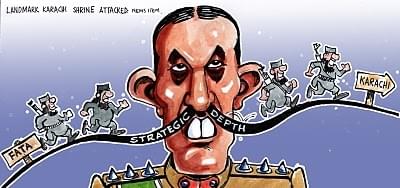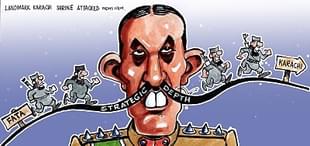Commentary
ISI: Pakistan’s Formidable Force Multiplier
Vinod Sharma
Aug 19, 2013, 04:39 PM | Updated Apr 29, 2016, 01:22 PM IST
Save & read from anywhere!
Bookmark stories for easy access on any device or the Swarajya app.


One has got to admire Pakistan. Is there any other example in history where a small nation has simultaneously taken on two much bigger countries, one a super power and the other deluding itself into believing that it is going to become one along its present trajectory, for such a painful ride, for so long, with barely concealed disdain and deceit?
Pakistan’s audacity backed by sheer brilliance in execution is the stuff history is made of. That it has been able to pull off a seemingly impossible double is as much a tribute to its leaders, both military and civil, as to the one instrument without peer that they have created: the Inter Services Intelligence (ISI). This covert arm of the military has been developed and honed, with some help from the CIA in 1980s, to become a huge force multiplier that has almost re-written the rules of war. It is this institution alone that has given Pakistan the luxury of playing the Jekyll and Hyde game on battlefields of its choosing in a manner that it wants, without exposing its troops to danger and its culpability to the enemy.
Pakistan sees ISI as its first line of defence. What is often overlooked is that for its leaders, Pakistan includes Afghanistan and Kashmir too. So for the Pakistani establishment—both military and civil— the ISI is not engaged in any hostile or offensive actions there, like the Americans and the Indians believe. It is only legitimately defending Pakistan against their aggression and is fulfilling its patriotic duty to defeat and throw them out. Add to its armoury the powerful tool of jihad and you have brilliant and motivated minds employing perfectly brainwashed foot soldiers itching to fight to death or blow themselves up for a cause they are made to see as religious and holy, and not merely political.
When the US invaded Afghanistan after 9/11, it probably thought it was going for a stroll in a park bombed flat by it. Actually it would have. But it failed to factor in Pakistan’s tenacity and duplicity, or may be it chose to look the other way because expanding the war was not an option. Either way, the Pakistanis assessed the situation far more accurately than the Americans thought they were capable of.Thanks primarily to the manner in which their battle-proven weapon, the ISI, sheltered, trained, equipped, deployed and controlled the Talibanis, the Americans have been defeated on the ground. That is why they are now open to once unimaginable compromises, so they can get out of the quagmire with minimum loss of face.
Let us be clear that the US is not losing its Afghan war to the Pathans who, as per the lore, have never lost to an aggressor. This is a myth being propagated and lapped up to obfuscate reality. The US is being defeated by a very clever and determined Pakistan. The divided Pashtuns were trounced by the ISI after the Soviets invaded Afghanistan, without a bullet being fired.
From wanting to wrest from Pakistan Pashtun areas on its side of the Durand Line, Afghan Pashtuns became Pakistan’s pathetic pawns, thanks primarily to the violent extremist Islamic ideology that the ISI sowed in them when the Soviets invaded their country and the manner in which the ISI deeply infiltrated into and controlled them. That strategy not only helped defeat the Soviets but, more significantly, it placed Afghanistan firmly in the Pakistani lap, giving the latter the strategic depth that it was looking for then and is well on the way to recreating now.
Despite the serious challenge posed by the presence and pressure of the Americans in Afghanistan, the ISI has not significantly let up it campaign in Kashmir, primarily though the LeT. Or even in the rest of India. The tactical reduction in terror attacks there to con the Americans does not mean that there has been any let up in the strengthening of the terror network in India, or in augmenting its ability to launch even more devastating attacks when ISI’s razor sharp top brass gives the green signal. Unfortunately, our candle-loving peace-nicks and faux intellectuals fighting a vicious domestic political battle against the BJP have deluded themselves/been deluded by the government into believing that the ISI is a lesser evil which, by making concessions to Pakistan, can be won over.
26/11 was the turning point that should have compelled India’s leaders to open their eyes. If that attack was not bad enough, the dramatics that followed since, starting from denying that Kasab was a Pakistani to mocking India’s dossiers as literature, the Sharm-el-Sheikh shame, aggressive and insulting reactions after Headley’s confessions, continuing infiltration of terrorists into Kashmir, beheading of Indian soldiers etc. should have made the Indians realise that they are dealing with an exceptionally clever, ruthless and never-say-die leadership that will use every means at its disposal to put pressure on India to make fatal concessions on Kashmir.
It will not let, forget ask, the ISI to take its foot even slightly off the terror pedal in and against India. But, just as the Americans failed to learn the right lessons from what Pakistan was doing to India, the Indians seem to have failed to learn too from it has done to the Americans in Afghanistan.
Headley’s startling exposure that the 26/11 attack was controlled and coordinated by the ISI from start to finish, and that the attackers were trained by Pakistan’s Navy, was the sort of information that Pakistan would have twisted with a knife in India’s gut, had India’s RAW been the guilty party. But what did Pakistan do?
It not only did not concede an inch to India, but actually demanded that any progress on 26/11 investigations be linked to progress on Siachen, Sir Creek etc. It seems to have escaped notice of the Indians that Pakistan’s Army Chief Kiyani was the head of the ISI till October 2008, a month before the Mumbai attack. So, in effect, the blame for 26/11–and by deduction other terror attacks too–lies right on the doorstep of the de facto ruler of Pakistan.
Yet, leading establishment intellectuals like Ram Guha want to mislead India into believing that the ISI is a non-state actor and is no worse than VHP or Bajrang Dal. It is such patently false assertions that enable powerful voices in the Congress party and the government, including Sonia-loyalist Mani Shankar Aiyar and India’s Foreign Minister Salman Khurshid,to peddle the line that India has not choice, but to helplessly persist with an aimless, “uninterrupted and uninterruptible dialogue” with Pakistan, because the only alternative visible to them, a full-fledged war, is unthinkable.
As far as Pakistan is concerned, one cannot but infer that for it the primary purpose of talks is to keep progressively legitimising on paper the gains that ISI’s well disguised military successes make on the ground and in Indian minds, in consonance with its strategic objective of weakening and eventually defeating India.
India’s own covert operations outfit, rightly named RAW in a rare moment of enlightenment, has singularly failed to nail the ISI, despite being on this very job for decades, with a huge budget to boot. It has taken Abdul Karim Tunda, for example, to reveal that India’s Most Wanted Dawood Ibrahim not only lives in Karachi but is protected by the ISI and moves around under its cover. This is further proof that the ISI, whose Director General reports to the Army Chief, conducts its many dangerous businesses with clinical professionalism, and knows how to keep them under wraps from amateur Indian eyes.
Worse is the fact that it exposes another huge and unacceptable chink in India’s armour against Pakistan: RAW is a poorly-led-by-police-officers and driven-by-babu-culture set up that lacks the political direction, professionalism, commitment and motivation required to face, tackle and defeat a fanatic force multiplier like the ISI that is led and controlled by the real rulers of Pakistan.
All this bodes ill for India. Once Pakistan achieves the primacy it is on its way to in Afghanistan, all but drives India out from there, and makes full use of the infrastructure that India’s much touted ‘soft power’ has created in that country, the ISI’s energies, spurred by its spectacular success in Afghanistan, will focus almost wholly on India, as even Akbaruddin Owaisi had warned a year or so back on a TV show. Some of us comfort ourselves by fantasising that Pakistan will be soon be swallowed by the very jihadi elements its has spawned. What makes us believe that its leaders are so against that happening?.
If they have completely radicalised Afghanistan, almost achieved the same in the Valley, and are encouraging such elements in Pakistan too, does that make them wary of radicalising the whole of Pakistan too in the same manner? It is not a few thousand ISI-trained fighters of the Taliban or the LeT who will run over Pakistan’s half a million strong Army. Logically, the Army itself will, at some point of time, adopt the Islamist ideology that already drives the ISI.
Is India even thinking of preparing to meet these challenges, or do our leaders still fancy that the only way to defend and protect India is to sit across the table and make one unilateral concession after the other to Pakistan? Does India have a plan to defeat the challenges that it is almost certain to face? The way some of our leaders brainlessly dismiss any other option, no matter what Pakistan does, by invoking the fear that Pakistan is a nuclear powered state, tells us that the Pakistanis have read Indian minds well and know that they can get away with everything short of a declared war, and that India will do little more than make meaningless noises to assuage public opinion.
Much of the credit for the fact that Pakistan has fearlessly and aggressively bled India for over three decades, needs to be given to the one outstanding creation of Pakistan’s military, the ISI. This covert military outfit is an innovative and powerful instrument of war, an invisible and formidable force multiplier.
To counter it, not only has India has not been able to find an answer but, given the predilections of its political leadership, is unlikely to do so in future too. Much as India’s ineptitude and worse hurt me as an Indian, I have to admire what Pakistan–a nation that is 1/6th India’s size and with 10th India’s GDP–has achieved through the ISI, whose successes have been nothing short of spectacular. Wish we could learn what it has been trying to teach us.
(Image Courtesy- Google Images)
Vinod Sharma tweets at @vinod_sharma.





